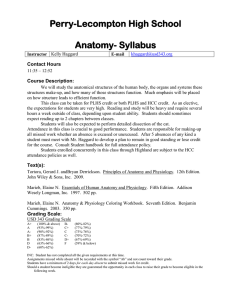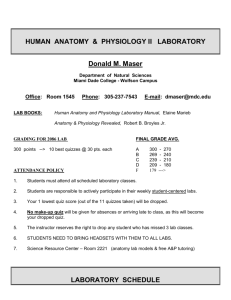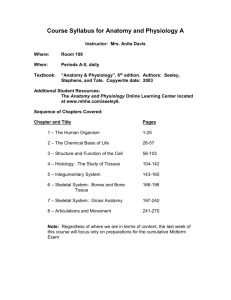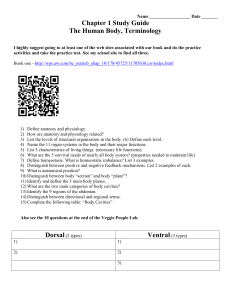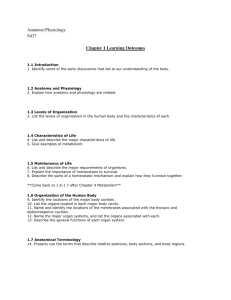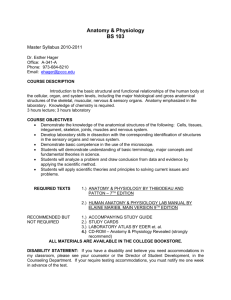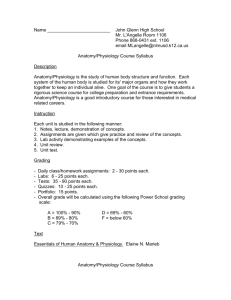File
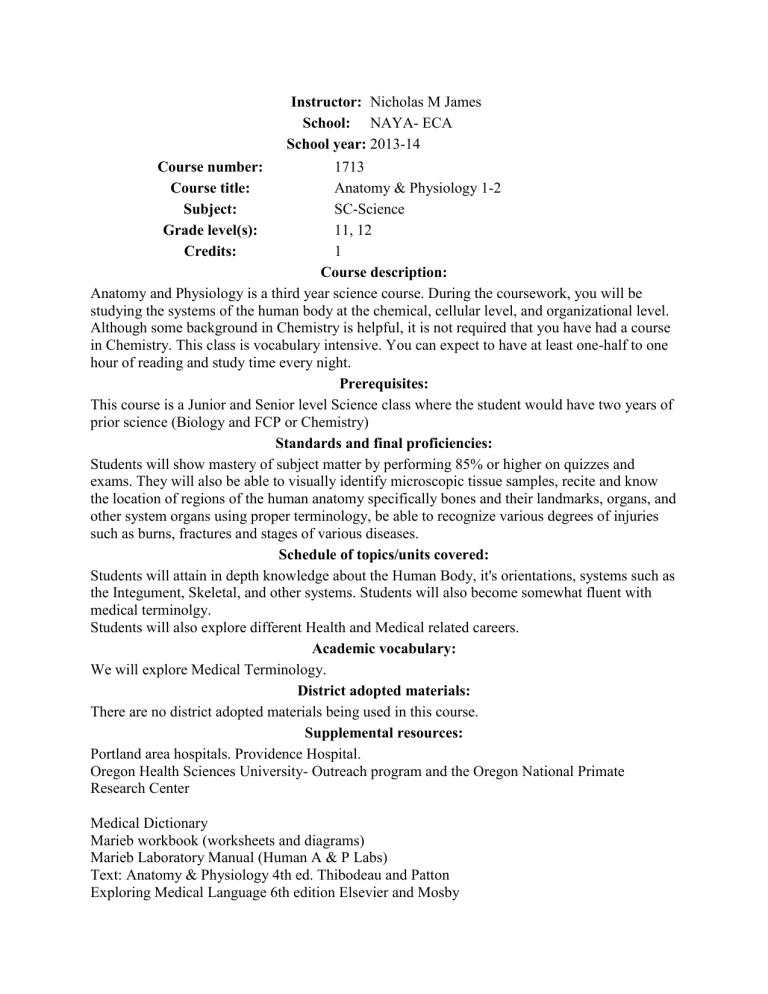
Instructor: Nicholas M James
School: NAYA- ECA
School year: 2013-14
Course number:
Course title:
Subject:
Grade level(s):
Credits:
1713
Anatomy & Physiology 1-2
SC-Science
11, 12
1
Course description:
Anatomy and Physiology is a third year science course. During the coursework, you will be studying the systems of the human body at the chemical, cellular level, and organizational level.
Although some background in Chemistry is helpful, it is not required that you have had a course in Chemistry. This class is vocabulary intensive. You can expect to have at least one-half to one hour of reading and study time every night.
Prerequisites:
This course is a Junior and Senior level Science class where the student would have two years of prior science (Biology and FCP or Chemistry)
Standards and final proficiencies:
Students will show mastery of subject matter by performing 85% or higher on quizzes and exams. They will also be able to visually identify microscopic tissue samples, recite and know the location of regions of the human anatomy specifically bones and their landmarks, organs, and other system organs using proper terminology, be able to recognize various degrees of injuries such as burns, fractures and stages of various diseases.
Schedule of topics/units covered:
Students will attain in depth knowledge about the Human Body, it's orientations, systems such as the Integument, Skeletal, and other systems. Students will also become somewhat fluent with medical terminolgy.
Students will also explore different Health and Medical related careers.
Academic vocabulary:
We will explore Medical Terminology.
District adopted materials:
There are no district adopted materials being used in this course.
Supplemental resources:
Portland area hospitals. Providence Hospital.
Oregon Health Sciences University- Outreach program and the Oregon National Primate
Research Center
Medical Dictionary
Marieb workbook (worksheets and diagrams)
Marieb Laboratory Manual (Human A & P Labs)
Text: Anatomy & Physiology 4th ed. Thibodeau and Patton
Exploring Medical Language 6th edition Elsevier and Mosby
Kaplan Medical Coloring Book (supplemental diagrams)
Differentiation/accessibility strategies and support (TAG, ELL, SpEd, other):
The differentiation strategies used in this course are based on the evidence (data) received through multiple forms of pre, ongoing, and formative assessments. Described here are the types of assessments used and specific differentiation strategies in place to meet the needs of ALL learners (including TAG, ESL, Special Ed...)
Games and Puzzles as alternatives to quizzing.
Job Shadow opportunities- Career Pathways Credit
Accomodations/modifications are provided according to individual student's 504 Plan or IEP.
Students also work in cooperative learning groups on dissections, peer checking on vocabulary with flashcards, as well as assignments done individually to practice concepts learned in text.
Students are guided through tiered instruction with vocabulary and basic concepts, then leading to higher level critical thinking group discussions connecting what they learn in text and how it relates to real world health related issues. Students are highly encouraged to attend lectures at
OHSU and Providence on various topics for which Research Scientists are currently involved in.
Career-related learning experiences (CRLEs):
Field trips
Guest speakers
Career Information System (CIS)
Internships
Project-based Learning
Service Learning
ODE Essential Skills and related Work Samples:
Assessment/evaluation/grading policy:
Proficiency Grading
Daily work and notes will continue to be taken and graded. Tests will be graded in a percentage.
70-100% is Proficient.
70% of the exceed questions will result in a Exceed grade for the Standard.
Exceed will need to Answer correctly 75% all exceeds questions.
Standard – Grade Conversion
A – 1/2 of Standards are Exceed 1/2 Proficient
B- 1/3 Exceeds, 2/3 Proficient
C- All Proficient
All test and quizzes can be taken without the finishing of assignments, the first time. If a quiz or test is to be taken a second time the student must have all assignments pertaining to the quiz or test before re take can occur.
Each Unit will have an Assignment Standards as well as a Curriculum
***Anyone who is caught cheating on a test (including persons who cheaters are cheating off of) will receive a zero for the test score.
Behavioral expectations:
Hall Passes/Attendance Policy
Any student who leaves class during class time must have a Hall Pass assigned by the instructor.
See your Student Handbook for details of the Attendance Policy. All students with 15 or more absences in a semester must petition for their grade. In Anatomy & Physiology, attendance counts for a portion of your grade.
Common Courtesy & Etiquette
Good etiquette is practiced in this classroom. Rude, loud, and obnoxious behavior will not be tolerated. Be polite and respectful. Follow all classroom and school rules. No whining please!
Class Conduct
You have a right to be here and receive an education. Disruptions to the educational process may result in a discipline referral. All school policies and expectations will be reviewed and applied in this class even when substitute teachers are teaching the class.
Property Loss or Damage
Stealing or vandalizing school property that belongs in the classroom or to others around you will result in a consequence to be determined by teacher and/or administration.
Health and Safety
The following items listed below will not be accepted or tolerated in this classroom and is considered to be a disruption to the educational process.
Inappropriate use of class time
Throwing objects in the classroom
Hazardous use of equipment, lab fixtures, or chemicals
Abuse of Lab specimens (living or nonliving)
Poor personal hygiene and inappropriate dress
Under the influence of illicit drugs or alcohol
Verbal or Physical Assault (includes abusive language and homophobic remarks)
Failure to follow lab rules outlined in the safety contract
***There will be NO EATING OR DRINKING OF ANY FOOD OR BEVERAGES
ANYWHERE IN THIS LABORATORY CLASSROOM.
Cell phones, Text messaging, and Ipods are not allowed in the classroom.
Safety issues and requirements:
Follow guidelines and operational procedures outlined in the PPS Safety Contract for Science
Laboratory Classroom.
They will also take the Safety guidelines quiz.
